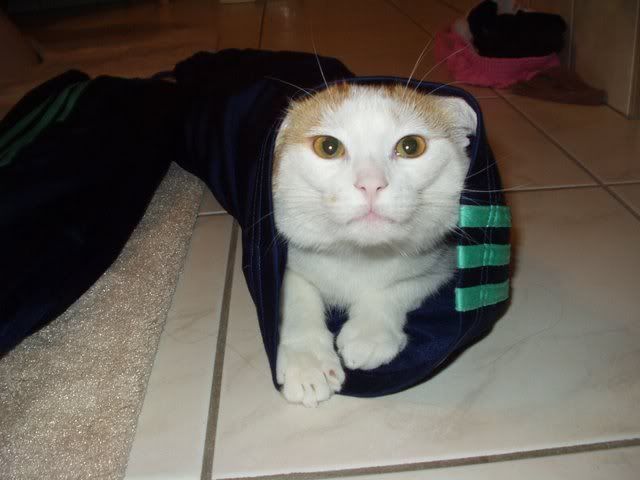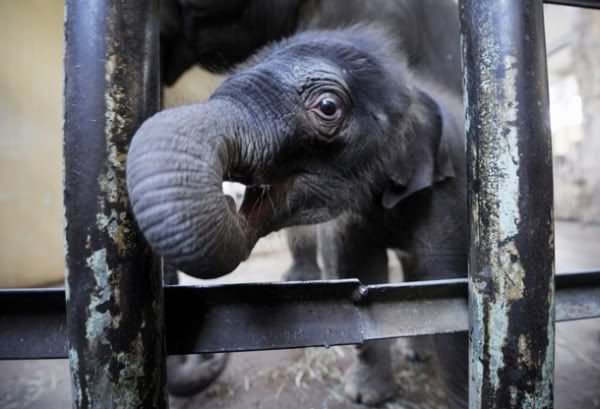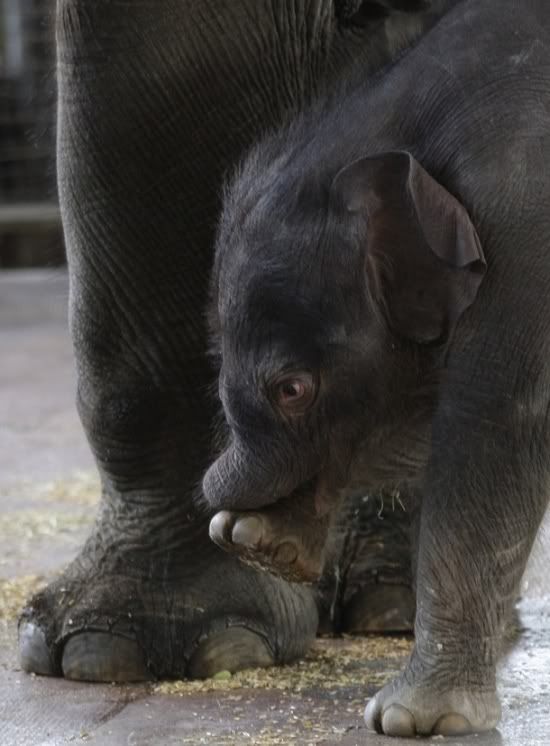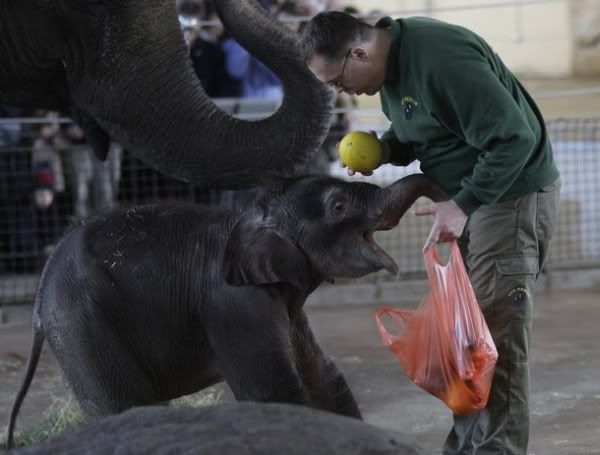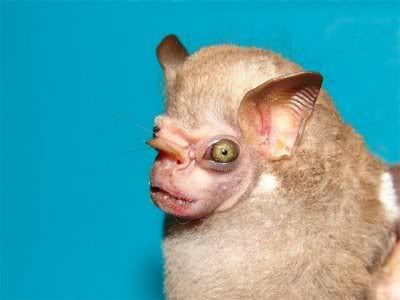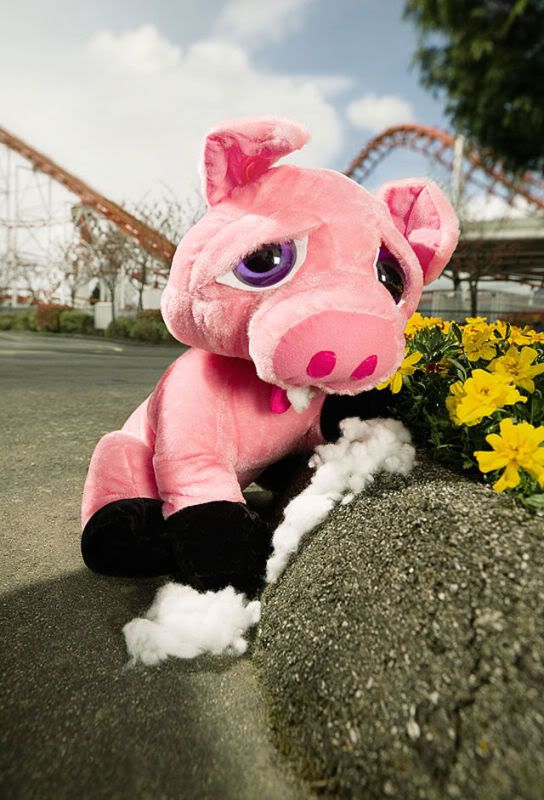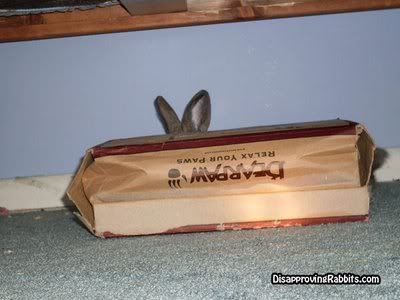 from Disapproving Rabbits
from Disapproving Rabbits
|
|
|
|||||
|---|---|---|---|---|---|---|
|
|
|
Tuesday, March 31, 2009
Many bird populations in trouble, report says
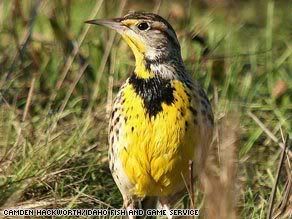 Just as they were when Rachel Carson published 'Silent Spring' nearly 50 years ago, birds today are a bellwether of the health of land, water and ecosystems.
Just as they were when Rachel Carson published 'Silent Spring' nearly 50 years ago, birds today are a bellwether of the health of land, water and ecosystems.From shorebirds in New England to warblers in Michigan to songbirds in Hawaii, we are seeing disturbing downward population trends that should set off environmental alarm bells.
The declines can be traced to a variety of factors, depending on a bird's particular habitat. But the causes most frequently cited in the report are agriculture, climate change, development and energy, and invasive species.
Source
Labels:
birds,
ecology,
environment,
wildlife
Many bird populations in trouble, report says
 Just as they were when Rachel Carson published 'Silent Spring' nearly 50 years ago, birds today are a bellwether of the health of land, water and ecosystems.
Just as they were when Rachel Carson published 'Silent Spring' nearly 50 years ago, birds today are a bellwether of the health of land, water and ecosystems.From shorebirds in New England to warblers in Michigan to songbirds in Hawaii, we are seeing disturbing downward population trends that should set off environmental alarm bells.
The declines can be traced to a variety of factors, depending on a bird's particular habitat. But the causes most frequently cited in the report are agriculture, climate change, development and energy, and invasive species.
Source
Labels:
birds,
ecology,
environment,
wildlife
Monday, March 30, 2009
Just wanted a pizza and a beer
Three people in the central Arizona community of Cottonwood were exposed to rabies after being attacked by a wild bobcat.
It all began when the animal attacked and scratched a woman who had gotten out of her car after thinking she had hit it.
A short time later, Cottonwood police got a report of a bobcat acting aggressively toward a woman outside a Pizza Hut.
Then, about an hour later, the bobcat wandered into the Chapparal Bar on Main Street forcing patrons up on their barstools.
Two men who were bitten before police shot and killed the animal in the parking lot.
Test later confirmed it was rabid.
Source
(via Perez Hilton)
It all began when the animal attacked and scratched a woman who had gotten out of her car after thinking she had hit it.
A short time later, Cottonwood police got a report of a bobcat acting aggressively toward a woman outside a Pizza Hut.
Then, about an hour later, the bobcat wandered into the Chapparal Bar on Main Street forcing patrons up on their barstools.
Two men who were bitten before police shot and killed the animal in the parking lot.
Test later confirmed it was rabid.
Source
(via Perez Hilton)
Just wanted a pizza and a beer
Three people in the central Arizona community of Cottonwood were exposed to rabies after being attacked by a wild bobcat.
It all began when the animal attacked and scratched a woman who had gotten out of her car after thinking she had hit it.
A short time later, Cottonwood police got a report of a bobcat acting aggressively toward a woman outside a Pizza Hut.
Then, about an hour later, the bobcat wandered into the Chapparal Bar on Main Street forcing patrons up on their barstools.
Two men who were bitten before police shot and killed the animal in the parking lot.
Test later confirmed it was rabid.
Source
(via Perez Hilton)
It all began when the animal attacked and scratched a woman who had gotten out of her car after thinking she had hit it.
A short time later, Cottonwood police got a report of a bobcat acting aggressively toward a woman outside a Pizza Hut.
Then, about an hour later, the bobcat wandered into the Chapparal Bar on Main Street forcing patrons up on their barstools.
Two men who were bitten before police shot and killed the animal in the parking lot.
Test later confirmed it was rabid.
Source
(via Perez Hilton)
Jasmine
I received the following story in today's email ... (Thanks, Lois)
In 2003, police in Warwickshire, England, opened a garden shed and found a whimpering, cowering dog. It had been locked in the shed and abandoned. It was dirty and malnourished and had clearly been abused.
In an act of kindness, the police took the dog, which was a Greyhound female, to the nearby Nuneaton Warwickshire Wildlife Sanctuary, run by a man named Geoff Grewcock and known as a willing haven for animals abandoned, orphaned or otherwise in need.
Geoff and the other sanctuary staff went to work with two aims..to restore the dog to full health and to win her trust. It took several weeks, but eventually both goals were achieved.
They named her Jasmine and they started to think about finding her an adoptive home.
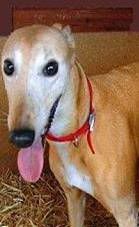 But Jasmine had other ideas.. No-one remembers now how it began, but she started welcoming all animal arrivals at the sanctuary. It wouldn't matter if it was a puppy, a fox cub, a rabbit or any other lost or hurting animal, Jasmine would peer into the box or cage and, where possible, deliver a welcoming lick.
But Jasmine had other ideas.. No-one remembers now how it began, but she started welcoming all animal arrivals at the sanctuary. It wouldn't matter if it was a puppy, a fox cub, a rabbit or any other lost or hurting animal, Jasmine would peer into the box or cage and, where possible, deliver a welcoming lick.
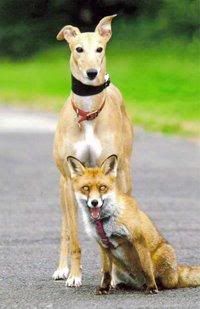 Geoff relates one of the early incidents. "We had two puppies that had been abandoned by a nearby railway line. One was a Lakeland Terrier Cross and another was a Jack Russell Doberman Cross. They were tiny when they arrived at the centre and Jasmine approached them and grabbed one by the scruff of the neck in her mouth and put him on the settee. Then she fetched the other one and sat down with them, cuddling them."
Geoff relates one of the early incidents. "We had two puppies that had been abandoned by a nearby railway line. One was a Lakeland Terrier Cross and another was a Jack Russell Doberman Cross. They were tiny when they arrived at the centre and Jasmine approached them and grabbed one by the scruff of the neck in her mouth and put him on the settee. Then she fetched the other one and sat down with them, cuddling them."
"But she is like that with all of our animals, even the rabbits. She takes all the stress out of them and it helps them to not only feel close to her, but to settle into their new surroundings.
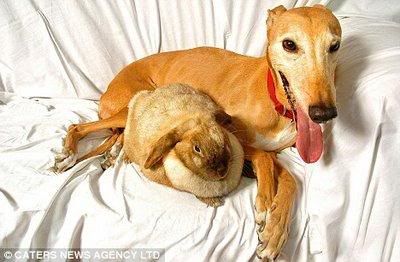 "She has done the same with the fox and badger cubs. She licks the rabbits and guinea pigs and even lets the birds perch on the bridge of her nose."
"She has done the same with the fox and badger cubs. She licks the rabbits and guinea pigs and even lets the birds perch on the bridge of her nose."
Jasmine - the timid, abused, deserted waif, became the animal sanctuary's resident surrogate mother, a role for which she might have been born. The list of orphaned and abandoned youngsters she has cared for comprises five fox cubs, four badger cubs, 15 chicks, eight guinea pigs, two stray puppies and 15 rabbits.
And one roe deer fawn. Tiny Bramble, 11 weeks old, was found semi-conscious in a field. Upon arrival at the sanctuary, Jasmine cuddled up to her to keep her warm and then went into the full 'foster mom' role. Jasmine, the greyhound, showers Bramble, the Roe deer, with affection and makes sure nothing is matted.
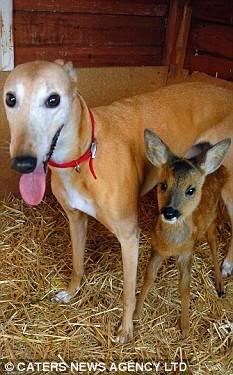 "They are inseparable," says Geoff. "Bramble walks between her legs and they keep kissing each other. They walk together round the sanctuary.
"They are inseparable," says Geoff. "Bramble walks between her legs and they keep kissing each other. They walk together round the sanctuary.
It's a real treat to see them."
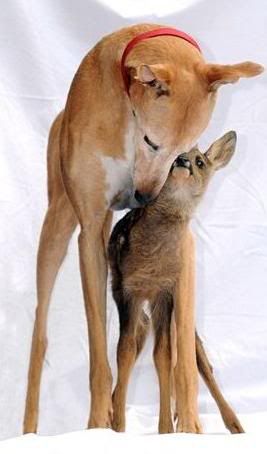 Jasmine will continue to care for Bramble until she is old enough to be returned to woodland life. When that happens, Jasmine will not be lonely. She will be too busy showering love and affection on the next orphan or victim of abuse.
Jasmine will continue to care for Bramble until she is old enough to be returned to woodland life. When that happens, Jasmine will not be lonely. She will be too busy showering love and affection on the next orphan or victim of abuse.
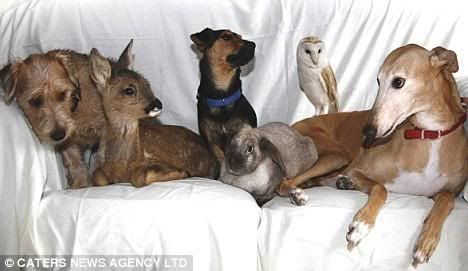 From left - Toby, a stray Lakeland dog; Bramble, orphaned Roe deer; Buster, a stray Jack Russell; a dumped rabbit; Sky, an injured barn owl; and Jasmine, with a Mothers heart, doing best what a caring Mother would do.
From left - Toby, a stray Lakeland dog; Bramble, orphaned Roe deer; Buster, a stray Jack Russell; a dumped rabbit; Sky, an injured barn owl; and Jasmine, with a Mothers heart, doing best what a caring Mother would do.
In 2003, police in Warwickshire, England, opened a garden shed and found a whimpering, cowering dog. It had been locked in the shed and abandoned. It was dirty and malnourished and had clearly been abused.
In an act of kindness, the police took the dog, which was a Greyhound female, to the nearby Nuneaton Warwickshire Wildlife Sanctuary, run by a man named Geoff Grewcock and known as a willing haven for animals abandoned, orphaned or otherwise in need.
Geoff and the other sanctuary staff went to work with two aims..to restore the dog to full health and to win her trust. It took several weeks, but eventually both goals were achieved.
They named her Jasmine and they started to think about finding her an adoptive home.
 But Jasmine had other ideas.. No-one remembers now how it began, but she started welcoming all animal arrivals at the sanctuary. It wouldn't matter if it was a puppy, a fox cub, a rabbit or any other lost or hurting animal, Jasmine would peer into the box or cage and, where possible, deliver a welcoming lick.
But Jasmine had other ideas.. No-one remembers now how it began, but she started welcoming all animal arrivals at the sanctuary. It wouldn't matter if it was a puppy, a fox cub, a rabbit or any other lost or hurting animal, Jasmine would peer into the box or cage and, where possible, deliver a welcoming lick. Geoff relates one of the early incidents. "We had two puppies that had been abandoned by a nearby railway line. One was a Lakeland Terrier Cross and another was a Jack Russell Doberman Cross. They were tiny when they arrived at the centre and Jasmine approached them and grabbed one by the scruff of the neck in her mouth and put him on the settee. Then she fetched the other one and sat down with them, cuddling them."
Geoff relates one of the early incidents. "We had two puppies that had been abandoned by a nearby railway line. One was a Lakeland Terrier Cross and another was a Jack Russell Doberman Cross. They were tiny when they arrived at the centre and Jasmine approached them and grabbed one by the scruff of the neck in her mouth and put him on the settee. Then she fetched the other one and sat down with them, cuddling them.""But she is like that with all of our animals, even the rabbits. She takes all the stress out of them and it helps them to not only feel close to her, but to settle into their new surroundings.
 "She has done the same with the fox and badger cubs. She licks the rabbits and guinea pigs and even lets the birds perch on the bridge of her nose."
"She has done the same with the fox and badger cubs. She licks the rabbits and guinea pigs and even lets the birds perch on the bridge of her nose."Jasmine - the timid, abused, deserted waif, became the animal sanctuary's resident surrogate mother, a role for which she might have been born. The list of orphaned and abandoned youngsters she has cared for comprises five fox cubs, four badger cubs, 15 chicks, eight guinea pigs, two stray puppies and 15 rabbits.
And one roe deer fawn. Tiny Bramble, 11 weeks old, was found semi-conscious in a field. Upon arrival at the sanctuary, Jasmine cuddled up to her to keep her warm and then went into the full 'foster mom' role. Jasmine, the greyhound, showers Bramble, the Roe deer, with affection and makes sure nothing is matted.
 "They are inseparable," says Geoff. "Bramble walks between her legs and they keep kissing each other. They walk together round the sanctuary.
"They are inseparable," says Geoff. "Bramble walks between her legs and they keep kissing each other. They walk together round the sanctuary.It's a real treat to see them."
 Jasmine will continue to care for Bramble until she is old enough to be returned to woodland life. When that happens, Jasmine will not be lonely. She will be too busy showering love and affection on the next orphan or victim of abuse.
Jasmine will continue to care for Bramble until she is old enough to be returned to woodland life. When that happens, Jasmine will not be lonely. She will be too busy showering love and affection on the next orphan or victim of abuse. From left - Toby, a stray Lakeland dog; Bramble, orphaned Roe deer; Buster, a stray Jack Russell; a dumped rabbit; Sky, an injured barn owl; and Jasmine, with a Mothers heart, doing best what a caring Mother would do.
From left - Toby, a stray Lakeland dog; Bramble, orphaned Roe deer; Buster, a stray Jack Russell; a dumped rabbit; Sky, an injured barn owl; and Jasmine, with a Mothers heart, doing best what a caring Mother would do.
Jasmine
I received the following story in today's email ... (Thanks, Lois)
In 2003, police in Warwickshire, England, opened a garden shed and found a whimpering, cowering dog. It had been locked in the shed and abandoned. It was dirty and malnourished and had clearly been abused.
In an act of kindness, the police took the dog, which was a Greyhound female, to the nearby Nuneaton Warwickshire Wildlife Sanctuary, run by a man named Geoff Grewcock and known as a willing haven for animals abandoned, orphaned or otherwise in need.
Geoff and the other sanctuary staff went to work with two aims..to restore the dog to full health and to win her trust. It took several weeks, but eventually both goals were achieved.
They named her Jasmine and they started to think about finding her an adoptive home.
 But Jasmine had other ideas.. No-one remembers now how it began, but she started welcoming all animal arrivals at the sanctuary. It wouldn't matter if it was a puppy, a fox cub, a rabbit or any other lost or hurting animal, Jasmine would peer into the box or cage and, where possible, deliver a welcoming lick.
But Jasmine had other ideas.. No-one remembers now how it began, but she started welcoming all animal arrivals at the sanctuary. It wouldn't matter if it was a puppy, a fox cub, a rabbit or any other lost or hurting animal, Jasmine would peer into the box or cage and, where possible, deliver a welcoming lick.
 Geoff relates one of the early incidents. "We had two puppies that had been abandoned by a nearby railway line. One was a Lakeland Terrier Cross and another was a Jack Russell Doberman Cross. They were tiny when they arrived at the centre and Jasmine approached them and grabbed one by the scruff of the neck in her mouth and put him on the settee. Then she fetched the other one and sat down with them, cuddling them."
Geoff relates one of the early incidents. "We had two puppies that had been abandoned by a nearby railway line. One was a Lakeland Terrier Cross and another was a Jack Russell Doberman Cross. They were tiny when they arrived at the centre and Jasmine approached them and grabbed one by the scruff of the neck in her mouth and put him on the settee. Then she fetched the other one and sat down with them, cuddling them."
"But she is like that with all of our animals, even the rabbits. She takes all the stress out of them and it helps them to not only feel close to her, but to settle into their new surroundings.
 "She has done the same with the fox and badger cubs. She licks the rabbits and guinea pigs and even lets the birds perch on the bridge of her nose."
"She has done the same with the fox and badger cubs. She licks the rabbits and guinea pigs and even lets the birds perch on the bridge of her nose."
Jasmine - the timid, abused, deserted waif, became the animal sanctuary's resident surrogate mother, a role for which she might have been born. The list of orphaned and abandoned youngsters she has cared for comprises five fox cubs, four badger cubs, 15 chicks, eight guinea pigs, two stray puppies and 15 rabbits.
And one roe deer fawn. Tiny Bramble, 11 weeks old, was found semi-conscious in a field. Upon arrival at the sanctuary, Jasmine cuddled up to her to keep her warm and then went into the full 'foster mom' role. Jasmine, the greyhound, showers Bramble, the Roe deer, with affection and makes sure nothing is matted.
 "They are inseparable," says Geoff. "Bramble walks between her legs and they keep kissing each other. They walk together round the sanctuary.
"They are inseparable," says Geoff. "Bramble walks between her legs and they keep kissing each other. They walk together round the sanctuary.
It's a real treat to see them."
 Jasmine will continue to care for Bramble until she is old enough to be returned to woodland life. When that happens, Jasmine will not be lonely. She will be too busy showering love and affection on the next orphan or victim of abuse.
Jasmine will continue to care for Bramble until she is old enough to be returned to woodland life. When that happens, Jasmine will not be lonely. She will be too busy showering love and affection on the next orphan or victim of abuse.
 From left - Toby, a stray Lakeland dog; Bramble, orphaned Roe deer; Buster, a stray Jack Russell; a dumped rabbit; Sky, an injured barn owl; and Jasmine, with a Mothers heart, doing best what a caring Mother would do.
From left - Toby, a stray Lakeland dog; Bramble, orphaned Roe deer; Buster, a stray Jack Russell; a dumped rabbit; Sky, an injured barn owl; and Jasmine, with a Mothers heart, doing best what a caring Mother would do.
In 2003, police in Warwickshire, England, opened a garden shed and found a whimpering, cowering dog. It had been locked in the shed and abandoned. It was dirty and malnourished and had clearly been abused.
In an act of kindness, the police took the dog, which was a Greyhound female, to the nearby Nuneaton Warwickshire Wildlife Sanctuary, run by a man named Geoff Grewcock and known as a willing haven for animals abandoned, orphaned or otherwise in need.
Geoff and the other sanctuary staff went to work with two aims..to restore the dog to full health and to win her trust. It took several weeks, but eventually both goals were achieved.
They named her Jasmine and they started to think about finding her an adoptive home.
 But Jasmine had other ideas.. No-one remembers now how it began, but she started welcoming all animal arrivals at the sanctuary. It wouldn't matter if it was a puppy, a fox cub, a rabbit or any other lost or hurting animal, Jasmine would peer into the box or cage and, where possible, deliver a welcoming lick.
But Jasmine had other ideas.. No-one remembers now how it began, but she started welcoming all animal arrivals at the sanctuary. It wouldn't matter if it was a puppy, a fox cub, a rabbit or any other lost or hurting animal, Jasmine would peer into the box or cage and, where possible, deliver a welcoming lick. Geoff relates one of the early incidents. "We had two puppies that had been abandoned by a nearby railway line. One was a Lakeland Terrier Cross and another was a Jack Russell Doberman Cross. They were tiny when they arrived at the centre and Jasmine approached them and grabbed one by the scruff of the neck in her mouth and put him on the settee. Then she fetched the other one and sat down with them, cuddling them."
Geoff relates one of the early incidents. "We had two puppies that had been abandoned by a nearby railway line. One was a Lakeland Terrier Cross and another was a Jack Russell Doberman Cross. They were tiny when they arrived at the centre and Jasmine approached them and grabbed one by the scruff of the neck in her mouth and put him on the settee. Then she fetched the other one and sat down with them, cuddling them.""But she is like that with all of our animals, even the rabbits. She takes all the stress out of them and it helps them to not only feel close to her, but to settle into their new surroundings.
 "She has done the same with the fox and badger cubs. She licks the rabbits and guinea pigs and even lets the birds perch on the bridge of her nose."
"She has done the same with the fox and badger cubs. She licks the rabbits and guinea pigs and even lets the birds perch on the bridge of her nose."Jasmine - the timid, abused, deserted waif, became the animal sanctuary's resident surrogate mother, a role for which she might have been born. The list of orphaned and abandoned youngsters she has cared for comprises five fox cubs, four badger cubs, 15 chicks, eight guinea pigs, two stray puppies and 15 rabbits.
And one roe deer fawn. Tiny Bramble, 11 weeks old, was found semi-conscious in a field. Upon arrival at the sanctuary, Jasmine cuddled up to her to keep her warm and then went into the full 'foster mom' role. Jasmine, the greyhound, showers Bramble, the Roe deer, with affection and makes sure nothing is matted.
 "They are inseparable," says Geoff. "Bramble walks between her legs and they keep kissing each other. They walk together round the sanctuary.
"They are inseparable," says Geoff. "Bramble walks between her legs and they keep kissing each other. They walk together round the sanctuary.It's a real treat to see them."
 Jasmine will continue to care for Bramble until she is old enough to be returned to woodland life. When that happens, Jasmine will not be lonely. She will be too busy showering love and affection on the next orphan or victim of abuse.
Jasmine will continue to care for Bramble until she is old enough to be returned to woodland life. When that happens, Jasmine will not be lonely. She will be too busy showering love and affection on the next orphan or victim of abuse. From left - Toby, a stray Lakeland dog; Bramble, orphaned Roe deer; Buster, a stray Jack Russell; a dumped rabbit; Sky, an injured barn owl; and Jasmine, with a Mothers heart, doing best what a caring Mother would do.
From left - Toby, a stray Lakeland dog; Bramble, orphaned Roe deer; Buster, a stray Jack Russell; a dumped rabbit; Sky, an injured barn owl; and Jasmine, with a Mothers heart, doing best what a caring Mother would do.
Sunday, March 29, 2009
How to piss off your neighbors

Terrible Tombstones are a good way to let your neighbors know that you do not enjoy their pets using your yard as their personal restroom.
You may not make many friends by putting this in your front lawn, but the point is well made.
$9.95 at Terrible Tombstones
(via Nerd Approved)
Labels:
animals,
humor,
merchandise
How to piss off your neighbors

Terrible Tombstones are a good way to let your neighbors know that you do not enjoy their pets using your yard as their personal restroom.
You may not make many friends by putting this in your front lawn, but the point is well made.
$9.95 at Terrible Tombstones
(via Nerd Approved)
Labels:
animals,
humor,
merchandise
Saturday, March 28, 2009
Caturday funnies
 I received this photo via email. If anyone knows the original photographer, let me know please.
I received this photo via email. If anyone knows the original photographer, let me know please.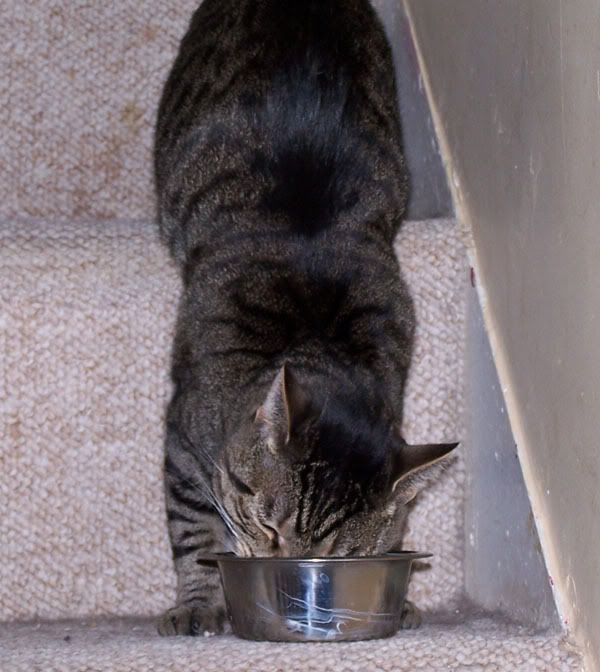 from When Cats Attack
from When Cats Attack
Caturday funnies
 I received this photo via email. If anyone knows the original photographer, let me know please.
I received this photo via email. If anyone knows the original photographer, let me know please. from When Cats Attack
from When Cats Attack
Friday, March 27, 2009
Ouch!
 A man poses with the alleged largest egg in the world in central London. The egg was laid in the early 17th century by the now-extinct Great Elephant Bird of Madagascarto. It is priced at $7,340 and will be sold at The Chelsea Antiques Fair.
A man poses with the alleged largest egg in the world in central London. The egg was laid in the early 17th century by the now-extinct Great Elephant Bird of Madagascarto. It is priced at $7,340 and will be sold at The Chelsea Antiques Fair.Photo Credit: Shaun Curry-AFP/Getty Images
Labels:
animals,
birds,
extinction
Ouch!
 A man poses with the alleged largest egg in the world in central London. The egg was laid in the early 17th century by the now-extinct Great Elephant Bird of Madagascarto. It is priced at $7,340 and will be sold at The Chelsea Antiques Fair.
A man poses with the alleged largest egg in the world in central London. The egg was laid in the early 17th century by the now-extinct Great Elephant Bird of Madagascarto. It is priced at $7,340 and will be sold at The Chelsea Antiques Fair.Photo Credit: Shaun Curry-AFP/Getty Images
Labels:
animals,
birds,
extinction
Are cavers spreading lethal bat disease?
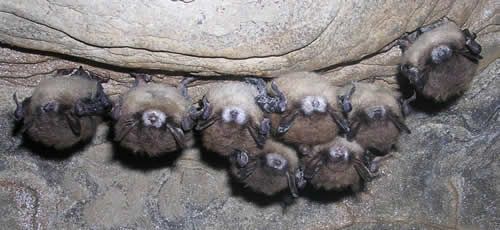 The white fungus that appears on bats' noses and wings — so-called white-nose syndrome — has killed more than a half-million bats over the past three winters, but scientists had not been able to figure out how the fungus got into the bat caves and why it spread.
The white fungus that appears on bats' noses and wings — so-called white-nose syndrome — has killed more than a half-million bats over the past three winters, but scientists had not been able to figure out how the fungus got into the bat caves and why it spread.Now, they have big clue: Humans, specifically cavers, who "may be spreading the causative agent."
Source
Photo Credit: Nancy Heaslip, New York Dept. of Environmental Conservation
Little brown bats with white-nose syndrome, New York
Labels:
animals,
bats,
environment,
science
Are cavers spreading lethal bat disease?
 The white fungus that appears on bats' noses and wings — so-called white-nose syndrome — has killed more than a half-million bats over the past three winters, but scientists had not been able to figure out how the fungus got into the bat caves and why it spread.
The white fungus that appears on bats' noses and wings — so-called white-nose syndrome — has killed more than a half-million bats over the past three winters, but scientists had not been able to figure out how the fungus got into the bat caves and why it spread.Now, they have big clue: Humans, specifically cavers, who "may be spreading the causative agent."
Source
Photo Credit: Nancy Heaslip, New York Dept. of Environmental Conservation
Little brown bats with white-nose syndrome, New York
Labels:
animals,
bats,
environment,
science
Thursday, March 26, 2009
Endangered and Dangerous
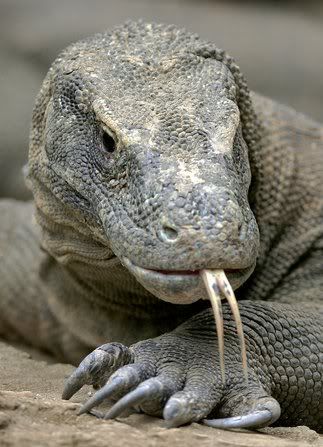 An Indonesian fisherman has been killed by Komodo dragons after he was attacked while trespassing on a remote island in search of fruit, officials said Tuesday.
An Indonesian fisherman has been killed by Komodo dragons after he was attacked while trespassing on a remote island in search of fruit, officials said Tuesday.Muhamad Anwar, 32, bled to death on his way to hospital after being mauled by the reptiles at Loh Sriaya, in eastern Indonesia's Komodo National Park.
Komodo dragons, the world's heaviest lizards, can grow up to 3 meters (10 feet) in length and have a toxic bite that they use to kill prey such as buffalo, returning to feast when the animal succumbs to the poison.
Despite their ungainly appearance, the carnivorous reptiles can run as fast as a dog in short bursts, jump up on their hind legs, and kill animals with a blow of their powerful tails.
Attacks on humans are rare, but Monday's incident is the latest in a series in which the monster lizards -- which have forked tongues and fearsome claws --have killed or injured people.
Last month a park ranger survived after a Komodo dragon climbed the ladder into his hut and savaged his hand and foot. In 2007 an eight-year-old boy died after being mauled.
In June last year, a group of divers who were stranded on an island in the national park -- the dragons' only natural habitat -- had to fend off several attacks from the reptiles before they were rescued.
Source
Photo Credit: Dita Alangkara-AP
Labels:
animals,
komodo dragon,
wildlife
Endangered and Dangerous
 An Indonesian fisherman has been killed by Komodo dragons after he was attacked while trespassing on a remote island in search of fruit, officials said Tuesday.
An Indonesian fisherman has been killed by Komodo dragons after he was attacked while trespassing on a remote island in search of fruit, officials said Tuesday.Muhamad Anwar, 32, bled to death on his way to hospital after being mauled by the reptiles at Loh Sriaya, in eastern Indonesia's Komodo National Park.
Komodo dragons, the world's heaviest lizards, can grow up to 3 meters (10 feet) in length and have a toxic bite that they use to kill prey such as buffalo, returning to feast when the animal succumbs to the poison.
Despite their ungainly appearance, the carnivorous reptiles can run as fast as a dog in short bursts, jump up on their hind legs, and kill animals with a blow of their powerful tails.
Attacks on humans are rare, but Monday's incident is the latest in a series in which the monster lizards -- which have forked tongues and fearsome claws --have killed or injured people.
Last month a park ranger survived after a Komodo dragon climbed the ladder into his hut and savaged his hand and foot. In 2007 an eight-year-old boy died after being mauled.
In June last year, a group of divers who were stranded on an island in the national park -- the dragons' only natural habitat -- had to fend off several attacks from the reptiles before they were rescued.
Source
Photo Credit: Dita Alangkara-AP
Labels:
animals,
komodo dragon,
wildlife
Endangered and Adorable
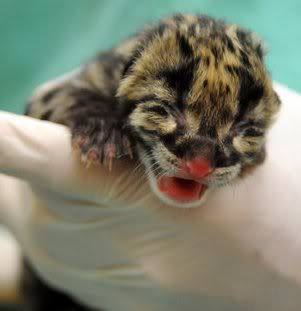
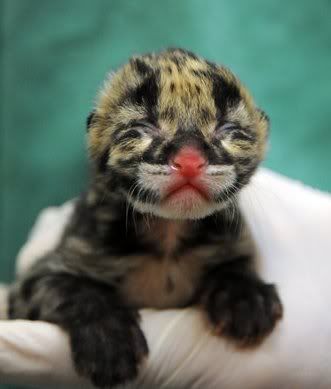
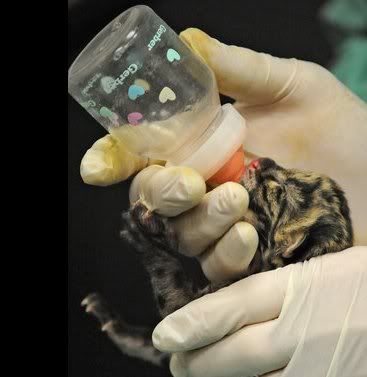
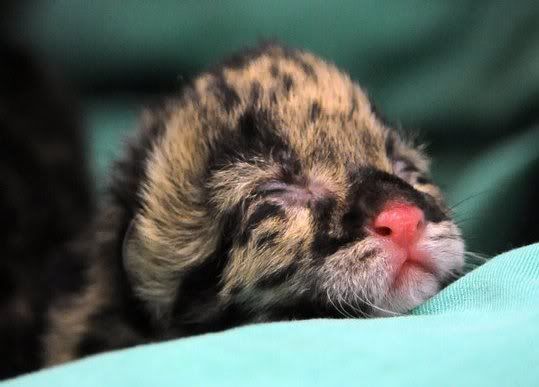
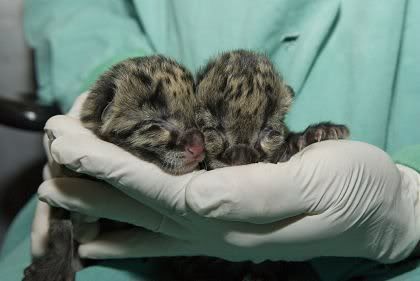
In the end, Hannibal did not administer the fatal bite to his mate's neck. And Jao Chu did not immediately kill their offspring, as is often the case.
And so, early yesterday, despite murderous tendencies in the captive species, two newborn clouded leopard cubs were found alive, well and squealing at the National Zoo's Conservation and Research Center in Front Royal, Va.
They were taken immediately from their gorgeous mother before she could do them harm, or do them in, placed in an incubator set at 88 degrees and fed salt water from baby bottles. Born with dappled, reptile-pattern fur, they were the first such births at the zoo in 16 years.
Their births were a coup, and the end of a complex reproduction saga involving an exotic, endangered and beautiful species of animal that experts call the ghost cat.
It was also a genetic home run: The zoo said the cubs' genes, which come from outside the captive population, make them among the most valuable clouded leopards in North America.
Source
Photo credit: Tracy A Woodward-The Washington Post
Subscribe to:
Posts (Atom)
